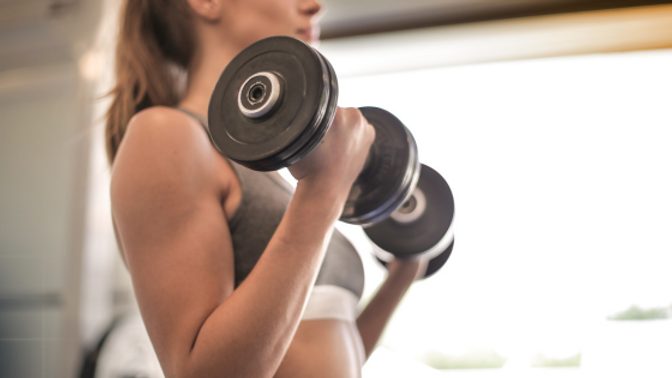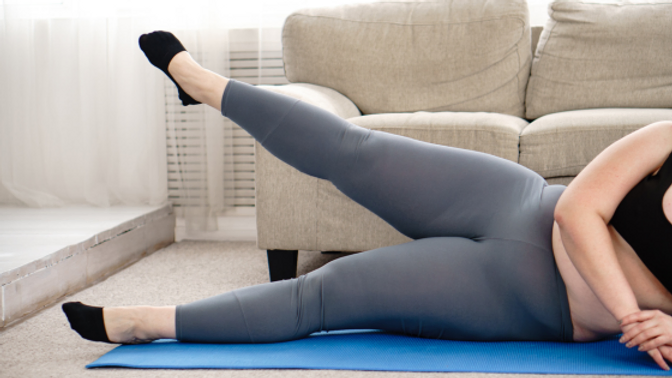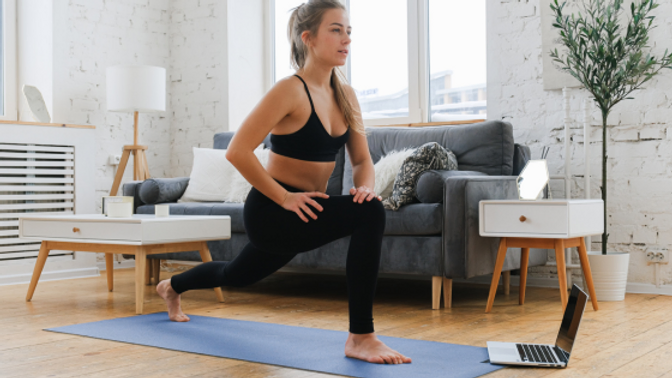Wondering whether BODi (formerly Beachbody) is right for you? Read this BODi dietitian review for all the details about this nutrition and fitness program.
Since its inception in 1998, BODi (formerly Beachbody) has been well known for its many different workout programs such as Insanity, P90x, 80 Day Obsession, and more. They’re also known for their nutrition programs such as Portion Fix, 2B Mindset, and what is perhaps their biggest money-maker: Shakeology.
Insanity and P90x were actually some of my first exposures to fitness. As an adolescent, I would watch them in the basement of my parents’ home. This suited me because I was still shy and embarrassed about working out. I would honestly be happy to do those workout programs today, I genuinely loved them (and Focus T25).
Anyway, with so many programs, past and present lawsuits (oh yes), questionable coaching, and a recent rebranding – there’s a lot to unpack here. Let’s get into it.
What is BODi (formerly Beachbody)?
Beachbody (now known as BODi) is the parent company for all kinds of exercise programs, diet programs, and supplements with a variety of trainers, on-demand platforms for workouts, and a whole host of coaches who sell their products.
Beachbody started in 1998, founded by Carl Daikeler and Jon Congdon. Interestingly, neither Daikeler or Congdon have a background in health/fitness sciences. Daikeler’s degree is in corporate organizational media and Congdon has a degree in political science.
We see this a lot in massive weight loss companies like Noom and WW (formerly Weight Watchers): a founder (or founders) who were opportunists and had a business idea in the weight loss industry with little to no professional training on the subject.
Beachbody vs BODi
In 2023, Carl Daikeler (CEO of Beachbody) shocked the world in an open letter to the public stating that Beachbody was becoming BODi, a new name to reflect a new focus on what they call Health Esteem.
Daikeler states in his letter:
“The flaw is not in the program or the approach. It’s just missing the step of detaching our self-esteem from the outcome. That message, amplified through social media, has become, “If you look good, you will be happy.” …
Deep down we all know that message is not true. You’re not happy because you look good; you’re happy when you FEEL good…
And that’s why over the next several months, we are making a significant pivot to serve people with a platform designed to do exactly that: Support the whole person and help them achieve that kind of instant satisfaction, a positive Health Esteem.”
Some are skeptical of this rebrand and say it is just a desperate attempt to stay relevant after the business wasn’t doing well financially (as you can see from their stock reports).
As for me, I went into this BODi dietitian review with an open mind. I truly want to believe that this is a positive change, aimed to create more “Health Esteem” in the individuals that BODi comes in contact with. Keep reading to discover if BODi is actually helping others love themselves, or if this rebrand is total B.S.
Why is Beachbody now called BODi?
BODi (formerly Beachbody) has made a shift to focus more on self-esteem and mindset, and not putting unrealistic ideals or expectations on individuals using the platform. They claim to now be a “health esteem” platform as they want to focus on “people loving their life, no matter what kind of week they are having”.
We may never know whether Beachbody’s shift to BODi was a genuine desire to better serve their community, or just a desperate attempt to revive a dying brand after years of a financial downward spiral. But I’ll give you my best guess on the matter.
Many people were offended by the name “Beachbody”, adamantly reminding others that any body is a beach body (all you need is a body and a beach). Carl Daikeler’s letter to the public announcing the rebrand, he states that Beachbody was never meant to propel an ideal body type, and for that he apologizes:
“… part of this shift is also acknowledging the possibility that for some, we played a role in projecting the notion that fitness and nutrition are about chasing an ideal, and for that, I apologize.”
I would like to think this is a true change within the company and they are no longer focused on just looking hot and are now shifting to be more inclusive, but I admit that I’m skeptical.

Is BODi different than Beachbody?
BODi is now stating that they want to focus on people loving themselves rather than trying to reach an unrealistic ideal that the previous Beachbody name and company may have projected. But is this genuine, or a desperate attempt to stay relevant?
When they changed the name to BODi, they added a mindset program and some BODi Block workout programs for more of a live-class feel.
I really wanted to know if BODi is actually different from Beachbody, or if they just slapped on a new name and created a random department/section of their offers that won’t truly change the rest of the company. Because the shift to BODi’s name and ideals is relatively recent (less than a year old at the time of this article), it was quite difficult to get a read on this.
For some people, they think a company like Beachbody can’t mean it when they say they no longer want to perpetuate chasing an ideal body or restrictive dieting. Don’t get me wrong, I’m skeptical too… but I’m not that skeptical to immediately deem someone a liar without giving them a chance.
So I asked around.
I tapped into different groups online to see if anyone had been a part of BODi post-rebrand, and what they thought of it.
Most said they didn’t want to pay the new price, so they canceled.
There were multiple responders who said they’ve enjoyed the rebrand and the updates to the programs.
One particularly shocking response said, “I have a friend who quit after the rebrand. She was diagnosed with diabetes shortly after and her upline and a few other people on her team accused her of faking it to justify her weight gain.” Big yikes.
But that could have just been the result of a few rotten eggs, not necessarily the whole company.
Many people noted that some of the figures most recognized for being a part of the BODi by Beachbody community are still stuck in the same skinny-is-best mindset (looking at you, Autumn Calabrese). This certainly isn’t helping instill faith that BODi is actually helping people work towards self-love, no matter where they are physically.
How BODi Works
The business model for BODi seems to be aimed at being a one-stop-shop for anything fat loss-related. They boast of now being a “health esteem” program and not deprivation-focused, but the nutrition programs offered still boil down to a goal of fat loss in some way, even though they aren’t explicitly saying those words.
Instead, they say things like “whether you want to lose weight or maintain your weight but tone up”. With that in mind, we can all agree it’s a fat loss-focused program still, right?
I’m not saying that’s a bad thing or wrong to focus on fat loss, if that’s what you want to do. But I’d rather they just double down and be clear about what their intentions are and be realistic about what this program’s focus is. Don’t beat around the bush with all this “health esteem” bullcrap if your programs are still about helping people with fat loss.
They offer exercise programs, nutrition programs, and supplements. Marketing messaging reminds you that fitness and nutrition have to go together to see results, thus they offer both.
BODi Memberships
Now that all Beachbody programs are grouped into one comprehensive BODi membership, I expected the cost to be more than it is. BODi memberships are actually pretty low at $10-15/month, depending on if you choose the 36-month plan, 12-month plan, or 3-month plan.
What I understand from reading reviews (1.0 overall stars on Trustpilot and 1.7 stars on Consumer Affairs … yikes), the price for a membership went up with the shift to BODi. I personally think the new pricing is still extremely reasonable considering how many programs you get access to. From what I understand it went from $10/mo to $15, but billed annually yes it can certainly feel like a lot.
From what the reviews are saying, it looks like the low ratings for BODi is actually due to people not being able to receive refunds or get in touch with customer service. Obviously, that is not cool.
What does a BODi membership include?
According to their website, a BODi membership includes all workout programs, the Portion Fix and 2B Mindset nutrition programs, and BODi Blocks which are a monthly set of live workout classes designed to be 3 weeks on, 1 week off.
There are 4 BODi blocks that you can choose to follow during the month: For Beginners Only Block, All Bodi Block, Iron Block, or Bike Block. New blocks are released each month, and the week-off offers an optional “Superblock” that you need to pay extra for, unless you got 2 free superblocks in a bundle.
From a business model perspective, this is an interesting and potentially genius move… Most people don’t get into a routine of 3 weeks on, 1 off. Rather, they get in a routine of working out in general and will be looking for something to do that 4th week. Extra $ for BODi. Of course, they could just do something else during that week off (or rest).

BODgroups
BODgroups are an optional way to connect with people doing similar things as you. As far as I can tell, they are free. However, the coach/partner running the group may have their own requirements for joining.
BODi Coaches
BODi coaches (now called “partners”) and BODi instructors are not the same thing. The instructors are certified to lead the fitness classes, while the coaches/partners are not. Let’s get into what a BODi partner really is.
What is a BODi coach?
BODi has an entire multi-level marketing (MLM) arm to their company. The independent consultants selling BODi products are given the title of “partner” by BODi (formerly called Beachbody coaches). Therefore, partners are just distributors. They are not certified coaches, registered dietitians/nutritionists, personal trainers, or hold any other qualification to advise you on supplements to take or nutrition plans to choose.
Interestingly, because these “partners” are independent consultants, BODi is not legally responsible for them. Therefore, if they make outlandish claims about BODi supplements curing cancer or reversing diabetes (all things that are illegal to claim), BODi doesn’t get in trouble with the Federal Trade Commission (FTC), just the individual does.
If you’re following along with me, this means this company has the potential to get away with a lot, if it wants to.
What does it cost to be a BODi coach?
From some podcasts I’ve listened to with ex-Beachbody coaches, the buy-in cost was about $40 initially, then $16/month after that NOT including any product they purchased. In most cases, customers become partners because they are sold this idea of “you might as well make some money and get your shakes at a discount”. Therefore, most partners (formerly coaches) are also paying for shakes/supplements because that’s what they were consuming in the first place.
All this considered, it probably costs around $200/month when the monthly fee, shakes, and BODi membership is all accounted for.
This estimate does not include any travel costs to conventions, cost of other health products or material possessions aimed to provide an illusion of being rich, fit, and successful (something that is often encouraged in MLMs), or the cost of someone’s precious time that they spend trying to sell these products on behalf of BODi.
I’ll circle back to the MLM aspect of BODi soon. Let’s touch base about their programs first.
BODi Programs
Instead of selling all the programs separately such as Insanity, P90x, 21 Day Fix, etc. like Beachbody used to, they moved to Beachbody On Demand which is now BODi. BODi offers all the workout programs on demand with 1 membership in addition to the Portion Fix and 2B Mindset nutrition programs. Supplements (like Shakeology), the superblocks for the 4th week of the month, and other random add-ons are sold separately.
How many programs does BODi have?
BODi offers hundreds of programs including their most popular programs like P90X, 21 Day Fix, Insanity, Focus T25, PiYo, 80 Day Obsession, Core de Force, and more.
Understanding BODi Workout Programs
I am not an expert on or educated in the field of kinesiology, so I won’t say too much about the workout programs that BODi offers.
However, I will say from personal experience that I really enjoyed P90x, Insanity, and Focus T-25. However, I did notice some knee pain from those programs. That could be a me issue or a program design issue. Who’s to say?
If there are any kinesiology experts/personal trainers who have opinions on these workout programs, by all means – I’m all ears.

BODi Diet Plans
BODi (formerly Beachbody) has 2 flagship diet plans: Portion Fix with Autumn Calabrese and 2B Mindset with Ilana Muhlstein, MS, RD. They offer both of these programs with the BODi subscription. As a registered dietitian myself, this is more where my expertise lies. Unsurprisingly, I have some thoughts. But first, let me explain how they work.
How do BODi diet plans work?
When Beachbody rebranded to BODi, they started focusing more on the concept of ‘health esteem’ stating you can have eating plans that make you “feel great while making progress”.
In the promotional video for BODi, they state “Instead of an industry that focuses on what you can’t have, health esteem helps you get more of what you love.”
They go on to state that BODis’ workout results are supported by the 2 eating plans that BODi offers (more on those below), and that these eating plans “reject diet and deprivation culture to help you fall in love with food again, without cutting out any food groups and with absolutely ZERO guilt.”
This right here is exactly what I want to focus on for the next section of this article. Are Portion Fix and 2B Mindset truly eating plans that reject diet and deprivation culture, do not make you cut out food groups, and all with zero guilt? Let’s dig in.
Portion Fix
Portion Fix was created by Autumn Calabrese, a celebrity fitness trainer who has no formal qualifications in nutrition (for anyone asking: a certification in holistic health coaching from the Institute of Integrative Nutrition does not count as a formal qualification. That’s another post for another day).
The idea of portion fix is to use special color-coded containers (that you can buy for $13 on Amazon, by the way) to portion out your food. The number of containers you get each day depends on your goals. You aren’t supposed to eat more than the amount of food you can fit in those containers each day.
Once a week you’re allowed fun foods like alcohol, treats, etc. As long as it fits into a container, of course.
This could be really appealing to someone who does well with being told exactly what to do, and who needs help with meal planning. As long as that individual doesn’t take things too seriously and becomes too strict with this eating plan, it may be beneficial for them. With that in mind, I won’t toss this out as being completely useless.
However, these boxes can be quite cumbersome and I have absolutely no idea how this would work if you were trying to eat a meal that had foods all mixed in together. Are casseroles ever an option on this “nutrition plan” aka diet? And the dishes. I mean, that alone is a hard pass for me.
Overall – the most important thing is to choose something you can do for the rest of your life. My guess is that these lil containers won’t make it to the birth of your first grandchild.
I have some more opinions about how I feel BODi is being misleading when they say they “reject diet and deprivation culture”, yet offer Portion Fix as one of their main nutrition plans. More on that later.
2B Mindset
2B Mindset is a program created by Registered Dietitian, Ilana Muhlstein. Immediately I am intrigued by this as it has the word “mindset” involved, and is created by someone sharing my same title. I have to admit though, I laughed when I learned what the 2B stands for.
“2B” is short for 2 bunnies. Yes. Really.
The premise of the program is 4 principles:
- Water first (16 oz of water before each meal and snack)
- Veggies most
- Use the scale (every morning)
- Track your progress
What does this have to do with bunnies, you ask? Well, remember in grade school when someone would come up behind you while your photo was being taken and give you bunny ears? If you make bunny ears with your hands, you have 4 fingers pointing up – 1 finger for each principle of the program.
I know, I know. I feel it, too. Complete and total bewilderment. That’s the best they could come up with?
This program also comes with a visual guideline of a plate (similar to MyPlate). Only this time, each plate is supposed to look different for every meal, and made up of the following portions:
- Breakfast: Water first then 50% protein, 50% carbs/fruit (this is the opportunity BODi has to plug in shakeology shakes)
- Lunch: Water first then 50% veg, 25% fiber filled carb, 25% protein
- Dinner: Water first then 75% veggies, 25% protein (note: NO carbs)
- Snacks: Water first then 50% veg, 25% fiber filled carb, 25% protein – but encouraged to skip them.
They try to skate around being restrictive by providing a “More? Sure!” guideline, but you are encouraged to follow a process of water first, then veg, then protein, then fiber filled carbs, repeat.
According to 2B, emotional eating is never okay, and you’re encouraged to eliminate “silly” carbs like muffins, cookies, or any other low fiber/high sugar product.
Listen, I don’t hate the encouragement of drinking more water and eating more veg as well as fiber-rich carbohydrates. Pretty much everyone could use more fiber and vegetables, and probably more water as well. But let’s be clear: this is a volume-eating diet.
Volume eating tries to use the stretching of the stomach with water and vegetables to ‘trick’ our body into thinking we’ve had enough food when we’ve actually been eating fewer calories, oftentimes to an extreme.
Unfortunately, this is a strategy used by a lot of pro-ana communities.
This can make us feel satisfied for a little while, but your body isn’t an idiot – it’ll catch on eventually. This may lead to revenge overeating and/or binge eating.

Are BODi diet plans restrictive?
Despite BODi’s new shift towards self-esteem and rejecting diet culture, it appears that their nutrition plans are still restrictive diets by nature.
Let’s look back at the claim made in BODi’s promotional video: “reject diet and deprivation culture to help you fall in love with food again, without cutting out any food groups and with absolutely ZERO guilt.” Do we think that Portion Fix aligns with that claim?
Not a chance in hell.
Just imagine cramming your food into these containers all day. You’ve been really active today (because #fitnessgoals) and you’re at a point in your menstrual cycle where you’re extra hungry. At some point, the containers have been maxed out and you’re out of options… buuuuuuut you’re starving. Wtf are you supposed to do now? According to the program, nothing.
Is BODi honestly trying to tell me/sell me that this isn’t a deprivation diet?
I’m not saying this is a bad idea for everyone, especially if it’s just short-term. Maybe it’s exactly what someone needs to get an idea of general serving sizes. But fundamentally, I don’t agree that we can put our nutrition needs in a box (quite literally).
Our needs vary from day to day. There will be days where it’s best for your body to eat in quantities different from the portions allowed by the boxes. This is called being a human.
As far as the 2B Mindset program is concerned, this is also pretty restrictive, and yes it does restrict food groups. They do not allow “silly carbs,” emotional eating (which isn’t harmful from time to time), and I see absolutely no mention of dietary fats. Additionally, snacks are not a part of the plan, though they say it IS technically okay to have them.
My fear and suspicion with this is that if it isn’t specifically on the plan, women will feel like they aren’t being strong enough if they snack, or that it will affect their goals therefore they’ll skip them all together. These can easily lead to over-restriction.
I could say more, but perhaps I’ll address these eating plans separately at another time (feel free to let me know if a separate review on each of these plans sounds yummy to you).
Are BODi diet plans healthy?
I see some good qualities about these programs: Portion Fix does a good job of getting someone used to eating a variety of food groups, and 2B Mindset encourages more veggies and fiber in a fiber-less world.
However, some big red flags I see are that putting someone’s nutrition needs into a box (like Portion Fix does) is unrealistic, and can even be dangerous. Additionally, we don’t need to completely eliminate “silly carbs” (like 2B Mindset tells us to) or put a ban on emotional eating without any real tools to navigate through how to overcome an emotional eating urge. It’s pretty well established that restricting foods in this way ultimately sets us up to want to do those things more. I’m sure you’ve even experienced that yourself.
Lastly, in 2B Mindset there is a noticeable lack of fats in the diet. Dietary fats are crucial for hormones, cardiovascular health, and to maintain a healthy gut microbiome. Without them, we may also lose a crucial aspect of our food: feeling satisfied.

BODi Supplements
The supplement industry (valued at 53 billion dollars in 2023) continues to grow. If you’re looking for a money-making machine, selling supplements is the way to go. Unsurprisingly, the largest moneymaker for BODi is their supplements: Shakeology shakes, Energize pre-workout, Collagen, protein powders, protein bars, etc.
Of course, we have a huge issue with the supplement industry: supplements are not regulated by the FDA. Meaning that supplements can have completely different ingredients than what they claim on the label and no one will know without a 3rd party check.
In fact, in a recent study done looking at the top 30 supplements sold on Amazon found we’re being lied to on a regular basis.
Researchers found:
- Over half of the supplements had inaccurate labels
- Over 40% of them had ingredients listed that weren’t found in the product at all
- A third of them had substances detected that weren’t disclosed on the packaging at all.
All this to say, the supplements that BODi sells might be popular, but that doesn’t mean they’re the supplements you think they are.
Shakeology Reviews
I want to do my best to give you an unbiased Shakeology review. Let’s break down what it is.
Shakeology is BODi’s version of protein shakes. They are sold as a monthly subscription or a one-time purchase for a cool $130/box, and are often upsold in BODi’s programs such as Portion Fix or 2B Mindset.
Are Shakeology shakes good for you?
Is Shakeology good for you? Shakeology shakes used to be marketed as a meal replacement shake. Though BODi doesn’t advertise them in that way anymore, it’s not uncommon for people to replace their meals with Shakeology. I would not advise this as they are only 160 calories, which is a snack at best. Replacing meals with a shake like this would be dangerous, especially if you’re replacing more than 1 meal/day.
Other than that, they aren’t necessarily bad for you (unless you are allergic to certain ingredients). The prebiotics, matcha, cinnamon, pea protein, flax seed, quinoa, and other ingredients included are certainly a boost in nutrients for the day, but they can exist in your diet without the shake which may be more appealing to you due to the steep cost of $130/box. They’re more of a “nice to have” rather than a “need to have”.
If you’re wondering whether Shakeology has probiotics, it does! The label states it contains bacillus coagulans, a probiotic or good bacteria. With that being said, the health benefits of probiotics are extremely overhyped, and this doesn’t actually make it more appealing to a dietitian like me.
And remember, if they’re like a lot of supplements, they might not even be in the product to begin with.
How healthy is Shakeology?
For how popular Shakeology is, we should probably see if the shakes are actually healthy. This, of course, depends on what the shakes are being used for. Are they replacing meals? Being served on the side of a meal? A post-workout snack? A generic snack? Let’s dig into some pros and cons of Shakeology.
Honestly, I wouldn’t consider these shakes useful for any reason except to provide some extra protein and fiber each day, IF those are things you struggle to get enough of. Having a 160-calorie drink for a meal is a terrible idea, but could be a nice way to beef up a pre-existing meal with extra nutrients you need some help with.
The claim that these shakes are filling is silly – of course a shake that’s high in protein and fiber will be filling. This isn’t exclusive to Shakeology and does not make it extraordinary from a shake you could make at home, or from a Carnation Instant Breakfast (which is only $0.80/packet compared to Shakeology at $4.30/shake).
Shakeology claims that their shakes are found to be superior in promoting fullness according to this study. However, the study was poorly designed as the shake they used for comparison was low in protein and fiber, both things Shakeology shakes are high in and that we know promote feelings of fullness. It was a study designed to favor Shakeology.
All in all, they probably won’t harm you… but, they aren’t going to be a magical solution either.

Is BODi (formerly Beachbody) an MLM?
“Team Beachbody” started in 2007, marking the beginning of an MLM revolution in the company. If you aren’t familiar with MLMs, it stands for Multi Level Marketing. MLMs get a lot of bad press (rightfully so) because they’re quite similar to an illegal business model called a pyramid scheme.
In both models, people recruit other people to join the company under them, usually involving some sort of buy-in fee that benefits the recruiter, not the recruitee. The process continues with people recruiting multiple people, eventually forming a pyramid-like hierarchy.
The only reason MLM’s aren’t considered pyramid schemes i.e. illegal is because there is a physical product involved. Therefore, they are legal.
How do BODi coaches make money?
BODi partners (formerly Beachbody coaches) are someone who will sell products and build a team under them to then sell products. The more people under them, the more money they make.
BODi Partners do not make money like a traditional employee does where they have a salary or a set hourly rate. Rather, they only make money by getting commissions when people purchase the product from them or when they recruit somebody to be a BODi partner as well.
How much do BODi (formerly Beachbody) coaches actually make?
According to the FTC, 99% of people in MLM’s lose or make no money. There’s no reason to expect BODi partners (formerly Beachbody coaches) would be any different. In fact, according to the Los Angeles times, 25% of Beachbody coaches didn’t receive a single check in 2021.
BODi (formerly Beachbody) Lawsuits
Speaking of Beachbody coaches not getting paid, there is currently a class action lawsuit against Beachbody stating that the company expects far too much and provides far too little in return for its coaches/partners. The lawsuit states that BODi should be hiring its partners as employees and paying them a proper wage for all the work they do and referrals they bring, rather than getting by with only having them earn tiny commissions.
Beachbody was in hot water for another lawsuit in 2018 and settled for $3.6M. The suit alleged the company signed members up for auto-renewal and charged their cards without customer consent. Yikes.
Is BODi coaching legit?
BODi coaches are nothing more than distributors for BODi’s products. They have absolutely zero qualifications to give health advice, unless those qualifications were earned elsewhere. BODi coaching that comes from BODi partners is not legit and should be taken with extreme caution, if not disregarded completely.
BODi instructors, on the other hand, do undergo some training to achieve a certification. Whether or not the certification is legitimate and properly equips these instructors is outside of my scope. I would love to hear from some personal trainers on the validity of these BODi instructors.
Will BODi help you lose weight?
Weight loss, of course, comes down to energy balance (calories in and calories out). Now, in terms of how we actually achieve a calorie deficit… that is much more complicated than people make it seem (such as BODi influencers).
If you are able to successfully reach a calorie deficit with BODI’s programs, then you may in fact lose weight. But do keep in mind that anything you do to lose weight must be maintained in order to keep the weight off.
An issue that many individuals have with the BODi programs is not being able to maintain what they did to lose the weight, such as measuring food in containers every day or volume eating with no ability to eat “silly carbs”.
How long does it take to lose weight on Beachbody?
Results will vary with anyone who joins BODi (formerly Beachbody). No two people are alike, and the programs they choose to partake in will vary as well. If you find yourself losing more than 2lbs/week, this could be unsustainable weight loss and even dangerous. Be sure you consult with a healthcare provider before starting any new diet/exercise program.
I know people say that all the time… but seriously, I mean it.

Is BODi worth it?
I don’t see anything wrong with the BODi membership for on-demand, at-home workouts. If it weren’t for all the terrible Beachbody on-demand reviews / BODi reviews regarding their customer service, I would probably get a BODi membership myself just for the fitness programs. But since there are so many bad reviews, I’m not convinced it is worth it.
When it comes to BODi’s nutrition offers, I hesitate to recommend them. One was founded by an illegitimate nutrition professional, the other is a volume eating approach that says you can never emotionally eat or have “silly” foods (and apparently doesn’t acknowledge that dietary fat matters).
Some individuals may thrive with a Portion Fix or 2B Mindset type of system. However, in my experience as a disordered eating dietitian and binge eating coach, nutrition plans like Portion Fix or 2B create a lot of opportunities for obsessing over food and taking things to the extreme, especially since 2B says to weigh yourself every day. This also creates an opportunity for revenge binge eating when one can’t maintain a dietary plan perfectly and have an all-or-nothing mentality about it.
That doesn’t mean it’ll happen every time, but it’s a risk that people need to be aware of.
I also don’t think these programs would come close to helping anyone who struggles with binge eating, emotional overeating, or someone with a history of yo-yo dieting. These programs just simply don’t have the right tools in place to assist with these delicate issues.
With that being said, my opinions are just that: opinions. If you enjoy those programs, that’s wonderful! I hope you find that they serve you and work well with your lifestyle. I have my concerns, but that doesn’t mean that BODi won’t be beneficial for anyone.
What perhaps most concerns me about this company is the MLM structure, plus the recent rebrand to BODi after an established pattern of decline in financial status. MLMs are notorious for having shady stuff going on behind the scenes, and engaging in sketchy schemes to get more labor for less money. Wouldn’t it make sense for a sketchy company to pivot their messaging, trying to appeal to the masses in an attempt to save themselves?
I really tried to love the rebrand… but watching the trailer for BODi on the website and reading the letter from CEO Carl Daikeler felt like a desperate attempt to make their brand more appealing in a climate where people don’t want to diet anymore. It feels like they got wise to that and didn’t want to be canceled… so they pivoted. Perhaps people on the inside would agree that BODi truly does promote self-esteem, joyful movement, and a healthy mindset around food/fitness. But as of this moment, I’m just not buying it. That could change.
The last thing I’ll mention is Shakeology. Honestly, save your money and just make a high-protein, high-fiber smoothie at home if you really want one. $4.30 for a shake at home is outrageous, and do you really want to be supporting a MLM company that didn’t even pay ¼ of their workforce in 2021? Not to mention the class action lawsuit alleging they are overworking and underpaying their contractors…
Not for me.
Is BODi (formerly Beachbody) healthy?
After learning about the ins and outs of this company, do we think that BODi (formerly Beachbody) is truly healthy? Let’s wrap up this dietitian review of Beachbody (aka BODi).
This really boils down to how you’re going to use the program. Are you going to use it for some ideas here and there, or to have some fun group-fitness style classes in the comfort of your own home?
Or are you going to follow everything they offer to a T and refuse to go outside the lines of what they recommend? If yes, I’m not sure that this is a healthy program. With unclear motivations, expensive supplements, and unqualified people giving out advice – it’s a no for me, dog.
If you’re a woman looking for help with binge eating, food guilt, or struggling with your body image, you may need a Registered Dietitian specializing in disordered eating and food psychology (spoiler: it’s me).
And by the way – I would bet I can relate to at least pieces (if not all) of what you’re feeling. I have my own history of struggling with disordered eating + body dysmorphia, and I know it sucks. That’s why I’m not here to bait you in with a promise of no deprivation but then slap some arbitrary food rules on you. Rather, I’m here to help you find peace and freedom with food while cultivating a healthy relationship with food, fitness, and your body.
Are you ready? Learn more about working with me here, or listen to my free podcast here.

